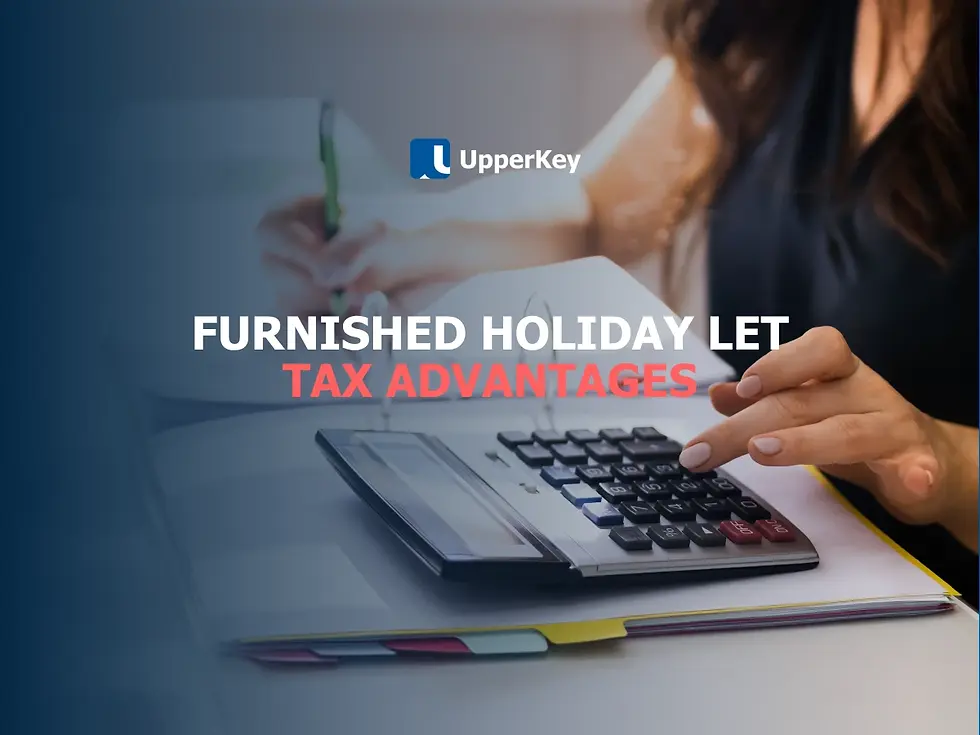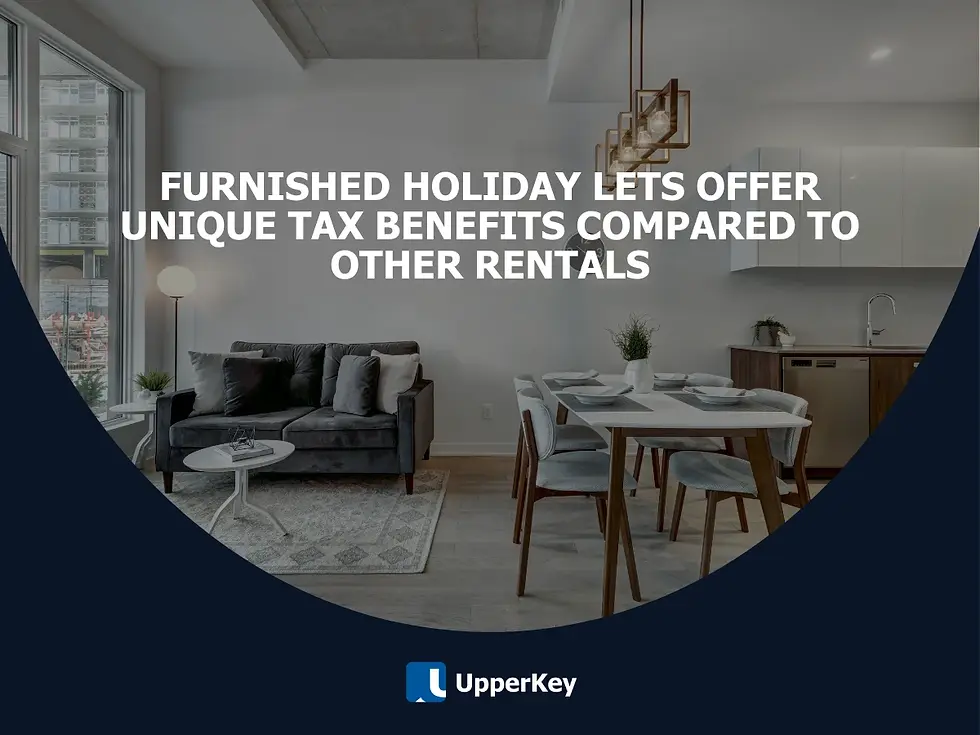Furnished Holiday Let Tax Advantages
- UpperKey

- Jul 16, 2025
- 7 min read
Navigating the world of property investments can often feel like deciphering a complex puzzle, especially when it comes to understanding the tax landscape. For those in the UK considering or already managing furnished holiday lets, there are distinct advantages that could significantly boost your financial returns. Unlike long-term rental properties, furnished holiday lets come with their own set of tax reliefs and benefits, making them an attractive option for savvy investors. This guide aims to unravel these tax perks, providing you with clear and practical insights into how you can maximise your investment. Join us as we delve into the ins and outs of furnished holiday lets and the potential tax benefits they offer.

Table of Contents
Understanding Furnished Holiday Lets
The concept of furnished holiday lets is crucial for property investors seeking to benefit from specific tax advantages. These properties serve a unique purpose and are distinct from other rental types. Let's explore what sets them apart and why they're important in the property investment landscape.
Definition and Criteria
Furnished holiday lets are properties that meet specific criteria set by HMRC. To qualify as a furnished holiday let, the property must be available for commercial letting to the public for at least 210 days a year. It should also be let for at least 105 days and cannot be let to the same person for more than 31 consecutive days during these periods.
These lets need to be furnished with essential amenities, ensuring a comfortable stay for short-term guests. Understanding these criteria is essential to ensure compliance and maximise potential benefits.
Meeting these criteria can unlock various tax advantages. It's essential for property owners to be diligent in maintaining records to prove eligibility.
Difference from Buy-to-Let
Furnished holiday lets differ from buy-to-let properties in several key ways. The primary difference lies in the duration and purpose of the let. While buy-to-let properties typically involve long-term contracts, furnished holiday lets cater to short-term stays.
Aspect | Furnished Holiday Let | Buy-to-Let |
|---|---|---|
Letting Duration | Short-term | Long-term |
Tax Reliefs | Available | Limited |
Furnishing Requirement | Required | Optional |
These distinctions impact the tax benefits and obligations associated with each type of property.
Understanding these differences is crucial for investors considering which route to take. Furnished holiday lets offer flexibility and can be a lucrative alternative to traditional buy-to-let investments.
Importance in Property Investment
Furnished holiday lets have gained significance in the property market due to their unique advantages. They offer flexibility, catering to a growing demand for short-term accommodation.
This type of investment can provide higher returns compared to standard rentals. The ability to adjust pricing based on seasonal demand allows investors to maximise income.
Moreover, furnished holiday lets are attractive due to potential tax advantages. With proper management, they can yield significant financial benefits.
Investors should weigh the benefits against the responsibilities and ensure they meet all criteria to take full advantage of this investment option.
Tax Advantages Overview

Furnished holiday lets come with several tax advantages that set them apart from other property types. These benefits can significantly impact an investor's bottom line. Let's take a closer look at these tax perks.
Capital Allowances Explained
Capital allowances are a major benefit for furnished holiday let owners. These allowances permit property owners to claim tax relief on certain expenses.
Qualifying Expenditure: This includes costs for furniture, appliances, and fixtures.
Claim Process: Owners can claim these allowances annually, reducing taxable income.
Impact on Tax: Properly utilising capital allowances can lead to substantial tax savings.
Effective management of these allowances is crucial for maximising returns. Property owners should keep detailed records of all eligible expenditures.
Understanding how to claim these allowances can provide a significant financial boost and enhance the profitability of furnished holiday lets.
Mortgage Interest Relief
Mortgage interest relief is another advantage for those owning furnished holiday lets. This relief allows owners to deduct interest paid on loans used to purchase or improve their property.
Interest relief can significantly lower the taxable income, providing financial relief. It's important to note that this relief is specific to furnished holiday lets.
Investors should consult with a tax professional to ensure they accurately calculate and claim this relief. Proper documentation is essential to support claims and maximise benefits.
This relief can make a marked difference in the overall profitability of a furnished holiday let investment.
Other Tax Deductions
Furnished holiday lets offer various other tax deductions, enhancing their appeal to investors. These deductions can cover a range of expenses.
Maintenance and Repairs: Costs associated with maintaining the property.
Utility Bills: Including water, electricity, and gas.
Insurance Premiums: Covering buildings and contents insurance.
These deductions can significantly reduce the taxable income, making furnished holiday lets more financially attractive. Property owners should keep meticulous records to ensure they claim all eligible deductions.
Taking advantage of these deductions can optimise the financial performance of a furnished holiday let investment.
Navigating Income Tax
Understanding how income tax applies to furnished holiday lets is key to managing their financial impact. Let's explore how to calculate profits and identify allowable expenses.
Calculating Profits
Calculating profits from a furnished holiday let involves determining the total income and deducting allowable expenses.
Total Income: Includes all rental payments and related earnings.
Allowable Expenses: Deduct eligible costs, such as maintenance and management fees.
Net Profit: The remaining amount is subject to income tax.
Properly calculating profits is essential for accurate tax reporting. Investors should maintain detailed records of all income and expenses to ensure compliance.
Understanding this process is crucial for optimising the tax position of furnished holiday lets.
Allowable Expenses
Allowable expenses are costs that can be deducted from the rental income of a furnished holiday let. These expenses include:
Repairs and Maintenance: Essential upkeep of the property.
Management Fees: Costs associated with hiring a property management service.
Utilities and Services: Regular expenses such as water, electricity, and cleaning services.
Properly tracking and documenting these expenses is vital. It ensures that investors can claim all eligible deductions and reduce their taxable income.
Being diligent about allowable expenses can significantly enhance the financial viability of a furnished holiday let investment.
Income Tax Savings
Furnished holiday lets can offer significant income tax savings if managed effectively. These savings arise from various allowances and deductions.
Capital Allowances: Reduce taxable profits.
Mortgage Interest Relief: Lowers the impact of mortgage costs.
Other Deductions: Further decrease taxable income.
Property owners should work closely with tax advisors to optimise their tax position and ensure all potential savings are captured.
Maximising these savings can bolster the financial performance of a furnished holiday let, making it a more attractive investment option.
Capital Gains Tax Considerations

When selling a furnished holiday let, it's important to consider capital gains tax (CGT). This section explores the reliefs available and their impact on long-term investments.
Private Residence Relief
Private residence relief can apply to furnished holiday lets if certain conditions are met. This relief reduces the amount of capital gains tax payable upon sale.
Eligibility: The property must have been the owner's main residence at some point.
Impact: Can significantly reduce CGT liability.
Understanding the criteria for this relief is essential for effective tax planning. Investors should evaluate their situation to determine eligibility.
Properly managing this aspect can substantially enhance the return on investment from furnished holiday lets.
Entrepreneurs' Relief
Entrepreneurs' relief is another potential benefit for furnished holiday let owners. It reduces the CGT rate when selling a business asset.
Criteria: Must meet specific conditions, such as owning the property for a qualifying period.
Benefit: Lowers the CGT rate, enhancing the net return from a sale.
Investors should consult with tax professionals to assess eligibility and understand the implications.
Utilising entrepreneurs' relief can significantly impact the profitability of a furnished holiday let investment.
Impact on Long-Term Investment
Capital gains tax considerations are crucial for those holding furnished holiday lets as long-term investments. Proper planning is essential to minimise CGT liability.
Strategic Selling: Timing sales to optimise reliefs available.
Tax Planning: Engaging with advisors to explore all available options.
Investors should consider CGT as part of their broader investment strategy. Proactively managing these aspects can enhance the overall return from furnished holiday lets.
Effective CGT planning is critical for optimising the financial outcomes of these investments over the long term.
National Insurance Implications
Owning a furnished holiday let can have implications for national insurance contributions. Understanding these impacts is vital for effective financial planning.
Class 2 vs Class 4 Contributions
Furnished holiday let owners may need to pay Class 2 or Class 4 national insurance contributions, depending on their situation.
Class 2: Typically for those with profits above a certain threshold.
Class 4: Based on self-employment status and profit levels.
Understanding which class applies is essential for compliance. Investors should seek guidance to ensure they meet their national insurance obligations.
Properly managing these contributions is crucial to avoid unexpected liabilities.
Impact on Self-Employment Status
Operating a furnished holiday let might affect an individual's self-employment status. This status impacts national insurance and tax obligations.
Criteria: Based on the nature and extent of the letting activity.
Implications: May require different tax filings and contributions.
Investors should clarify their status to ensure compliance and optimise their tax position.
Understanding the implications of self-employment status is vital for managing the financial aspects of furnished holiday lets.
Planning for Future Liabilities
Anticipating future liabilities related to national insurance is critical for furnished holiday let owners. Effective planning ensures financial readiness.
Forecasting Contributions: Estimating future obligations based on projected profits.
Budgeting: Setting aside funds to cover expected liabilities.
Investors should regularly review their financial situation and adjust their plans accordingly.
Proper planning for national insurance liabilities helps maintain the financial health of a furnished holiday let investment.





